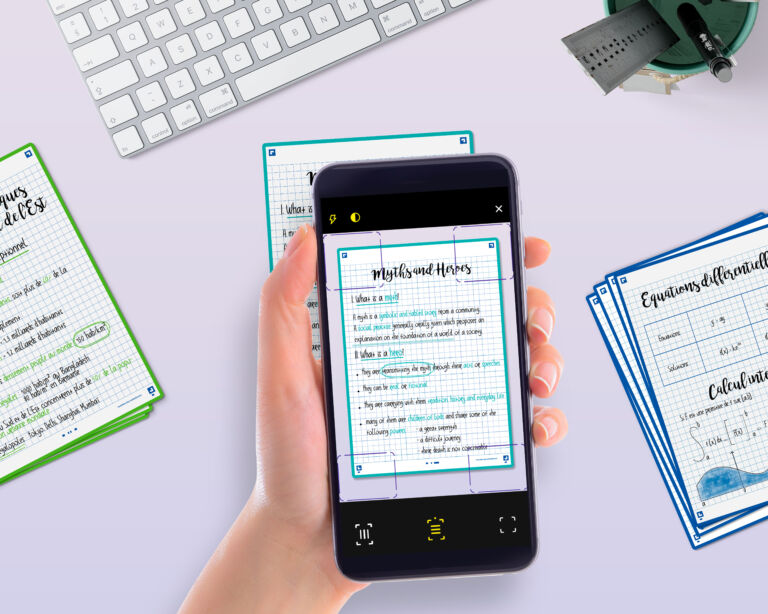
[Testimonial] Organising your revision from the beginning of the year: how to go about it?
A few weeks before the exams start, we tend to panic and wonder how we’re going to manage to retain all the information we’ve written down during the year. What if the secret was to get organised as soon as the new term starts?
Take a look at Manon’s study routine. She’s a master’s student. Here are her tips will for a peaceful, pressure-free year before the exams.
1) Take notes by hand
Manon’s first piece of advice is to take your notes on paper to help you remember the content.
There’s nothing like handwriting to help you remember the concepts you cover in class. There are two main reasons for this:
- When you form letters to handwrite a word, your brain is active and will retain the words you form. When you type on a computer, this process does not take place. That’s why you memorise much better when you write by hand rather than typing on a keyboard.
- When you write by hand, you sometimes don’t have time to write everything down. You must select information and rephrase it to have time to write down your lessons. This mental processing has the effect of anchoring the concepts in your memory.
2) Re-read your lessons to understand them properly
After a week at school, Manon takes the time to go back over all her lessons. The aim is to remember which subjects her teachers have covered but also to identify the concepts she doesn’t yet fully understand. Once she has identified them, she researches them on the internet or reads up about them in her textbooks to understand them properly.
Indeed, for Manon, learning without understanding is almost impossible or takes at least twice the time normally required. Instead, she prefers to anticipate retaining these concepts more easily.
Manon ends up rewriting her lessons in her own words and integrating the additional information necessary for her to understand them properly. Rephrasing and then handwriting the lesson helps her to memorise.
3) Making revision cards
After completing her lessons, Manon sorts through her course notes to extract only the essential information. In other words, she makes revision cards. But how do you make revision cards? What should you write on them?
A revision card should contain only the important information from the lesson, such as:
- Definitions,
- Important dates,
- Formulas,
- Essential vocabulary,
- Schools of thought,
- Diagrams,
- ..
It’s up to you to select what you think is important. If you have any doubts, ask yourself the following question: is this information essential for the proper memorisation of the course? If the answer is yes, the information should be included on the card.
To access your card whenever and wherever you want, scan your SCRIBZEE-compatible card with the smartphone app. You will then be able to revise during your downtime without having to carry all your revision cards with you.
You will also be able to track your revision progress thanks to the progress statuses, set reminders to remember to revise before your exams and share your cards with your friends.
4) Make flashcards
About 3 weeks before the exams, Manon makes flashcards, question/answer cards on her courses. This fun method is ideal for perfecting the learning of a course.
After having taken the important elements understood in her flashcards and reformulated them in question/answer form, Manon notes them on her small horizontal flashcards, making sure that each flashcard contains only one piece of information.
She then proceeds to memorise the elements from the paper flashcards and the SCRIBZEE mobile application.
- Revising with paper flashcards:
Revising flashcards includes different phases. At first, she learns her flashcards alone by reading the front of the card and then trying to recall the answer written on the back. She reviews the flashcards she hasn’t yet mastered more often.
Once she feels comfortable with the concepts, she revises with her friends. In pairs, each person takes a pile of flashcards and questions the other. In a small group, she creates a memory game with her flashcards by placing them all on the floor. In turn, each person picks a flashcard at random and has to find the answer. If they find the answer, they keep the flashcard. If they get it wrong, they put the flashcard back down. The aim is to collect the most cards by the end of the game.
- Review the flashcards with the SCRIBZEE mobile application:
After scanning her flashcards, Manon uses the Revision and Quiz modes in SCRIBZEE.
The Revision mode, based on the Leitner method, allows you to learn the concepts on the flashcards. You are shown flashcards that you haven’t yet mastered more often than the ones you have. The repetition allows you to learn them all by heart by the end.
The Quiz mode, on the other hand, allows you to check that you have mastered all the information contained on your cards by reviewing all the cards in the deck. At the end of the session, SCRIBZEE shows you your score. If it is not 100%, you can review the cards you have not mastered to focus on the ones you had trouble with. This mode is ideal to know where you stand before an exam.
To find out more about FLASH 2.0 flashcards and their use with SCRIBZEE, see our dedicated article.
Conclusion:
This process may seem time consuming but implementing this routine will allow you to memorise your lecture notes without difficulty. Rather than experiencing intense stress a few weeks before your exams, you will spread your efforts over the long term. As the exams approach, you’ll be more relaxed because you’re almost fully prepared. So, when are you going to start?




